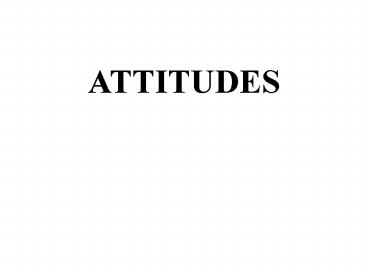ATTITUDES - PowerPoint PPT Presentation
1 / 40
Title:
ATTITUDES
Description:
Tricomponent model- attitudes are made up of all three categories (Affect, Behavior, Cognition) ... influence of long-standing values. Instrumental attitudes: ... – PowerPoint PPT presentation
Number of Views:157
Avg rating:3.0/5.0
Title: ATTITUDES
1
ATTITUDES
2
Attitude A positive or negative
evaluation of an object.
Attitude strength The importance of the
attitude.
3
Positive
Strong
Weak
Negative
4
Attitudes can be based on
- Affect/Feelings
- Cognitions
- Behaviors
- Or any combination of the three
5
Tricomponent model- attitudes are made up of all
three categories (Affect, Behavior, Cognition).
- We now know this is wrong
6
(No Transcript)
7
Values Indirectly Influence Behavior Through
Attitudes
- Values
- Enduring beliefs about important life goals that
transcend specific situations.
8
Values Indirectly Influence Behavior Through
Attitudes
Values
Attitudes
Behavior
Peace
Anti-war
Picket
9
Values do not influence all of our attitudes
Influenced by values
Not influenced by values
10
Values do not influence all of our attitudes
Symbolic attitudes Attitudes that are formed
through the influence of long-standing values.
Instrumental attitudes Attitudes based on
benefits and costs associated with the attitude
object.
11
An attitude that is symbolic for one person may
be instrumental for another
12
How Are Attitudes Formed and Maintained?
Repeated exposure can impact attitudes Mere
exposure effect- the tendency to develop more
positive feelings towards objects and individuals
the more we are exposed to them.
13
(No Transcript)
14
(No Transcript)
15
- Attitudes can be formed through classical
conditioning.
Classical Conditioning Learning through
association, when a conditioned stimulus is
paired with an unconditioned stimulus that
naturally produces an emotional response.
16
- Attitudes can be formed through classical
conditioning.
Classical Conditioning Learning through
association, when a conditioned stimulus is
paired with an unconditioned stimulus that
naturally produces an emotional response.
17
Staats Staats (1958)
German Table Dutch Gift Swedish
Failure American Chair
18
(No Transcript)
19
Reinforcement and punishment of behavior can
shape attitudes.
Operant Conditioning A type of learning in
which behavior is strengthened if followed by
reinforcement and weakened if followed by
punishment.
Observational Learning
20
Self-perception theory contends that behavior
causes attitudes.
Self-Perception Theory The theory that we
often infer our internal states, such as our
attitudes, by observing our behavior.
21
Self-perception theory contends that behavior
causes attitudes.
Self-Perception Theory The theory that we
often infer our internal states, such as our
attitudes, by observing our behavior.
Internal or External Attribution?
22
Attitudes are influenced by changes in facial
expression
Strack (1988) had students hold a pen in their
mouths while viewing cartoons
Facial feedback hypothesis
23
When Do Attitudes Predict Behavior?
24
Richard LaPiere (1934)
Would restaurant and hotel managers act on their
negative attitudes towards Asians and refuse
service to the Chinese couple?
- 1 of 66 hotels turned them away
- 0 of 184 restaurants turned them away
- Over 90 of respondents said they would not
serve the Chinese couple
25
Issues Related to Attitudes Predicting Behavior
Level of Attitude Behavior Specificity Specific
attitudes are better predictors of behavior than
are general attitudes.
26
Issues Related to Attitudes Predicting Behavior
- Private Versus Public Self-Awareness
- Froming (1982)
- Participants had private attitudes that they
thought differed from public standards - Some participants gave shocks while looking in a
small mirror - Some participants gave shocks in front of a small
audience - Some participants gave shocks with no mirror or
audience
27
Issues Related to Attitudes Predicting Behavior
Private Versus Public Self-Awareness
28
Issues Related to Attitudes Predicting Behavior
- Attitude Strength
- What makes an attitude strong?
- Acquiring more information about the attitude
object - Personal involvement with the attitude object
- 1978 Michigan Initiative to Raise the Drinking
Age From 18 21
29
Theory of planned behavior asserts that attitudes
influence behavior by shaping intentions
Fishbein Ajzen (1975) Theory of Reasoned
Action Ajzen (1991) Theory of Planned Behavior
30
Theory of planned behavior asserts that attitudes
influence behavior by shaping intentions
Theory of planned behavior- the theory that
peoples conscious decisions to engage in
specific actions are determined by their
attitudes towards the behavior in question, the
relevant subjective norms, and the perceived
behavioral control.
31
Theory of planned behavior asserts that attitudes
influence behavior by shaping intentions
32
Theory of planned behavior asserts that attitudes
influence behavior by shaping intentions
33
Theory of planned behavior asserts that attitudes
influence behavior by shaping intentions
34
Theory of planned behavior asserts that attitudes
influence behavior by shaping intentions
- Subjective norms- a persons judgment about
whether other people will approve of a particular
behavior - Product of 2 factors
- Perceived expectations of others
- Motivation to conform to those expectations
35
Theory of planned behavior asserts that attitudes
influence behavior by shaping intentions
Perceived behavioral control- ones perception of
how easy or difficult it is to perform a behavior
36
Criticisms of the theory of planned action
Theory ignores the possibility that attitudes can
result in spontaneous behavior.
37
Implicit Explicit Attitudes
Implicit Attitude An attitude that is
activated automatically from memory, often
without the person's awareness that she or he
possess it.
Explicit Attitude A consciously held attitude.
38
Implicit attitudes may create explicit attitudes
Implicit Attitudes
Explicit Attitudes (through self-perception)
Behavior
39
You Can Have Conflicting Implicit Explicit
Attitudes
Dual Attitudes The simultaneous possession of
contradictory implicit and explicit attitudes
toward the same object.
40
When do implicit and when do explicit attitudes
predict behavior?
Explicit rewards or social norms are
salient Implicit situational factors are
missing and the person is behaving more
spontaneously































